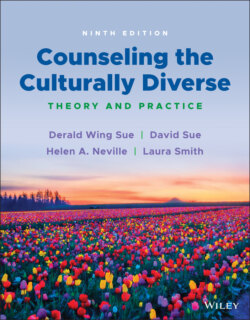Читать книгу Counseling the Culturally Diverse - Laura Smith L. - Страница 88
ACTIVITY DIMENSION
ОглавлениеOne of the characteristics of White European American cultural values is an action (or doing) orientation: we must master and control nature and we must always do something about a situation. Correspondingly, in counseling, we often expect clients to master and control their own lives and environment, to take action to resolve their own problems, and to fight against bias and inaction. The doing mode is evident everywhere and is reflected in how White Americans identify themselves by what they do—their occupations. “And what do you do?” is a typical conversation‐starter, and children are routinely asked what they want to do when they grow up. A higher value is given to inventors over poets, and to doctors of medicine over doctors of philosophy. An essay topic commonly given to schoolchildren returning to school in the fall is, “What I Did on My Summer Vacation.”
Traditionally, both American Indians and Latinx Americans often prefer a being or being‐in‐becoming mode of activity rather than a doing and what‐I‐did mode. The American Indian concepts of self‐determination and noninterference are examples. Value is placed on the spiritual quality of being, as manifested in self‐containment, poise, and harmony with the universe. Value is placed on the attainment of inner fulfillment and the essential serenity of one's place in the universe. Because each person is fulfilling a purpose, no one should have the power to interfere or impose values. Often, those unfamiliar with American Indian values misperceive these clients as stoic, aloof, passive, or inactive. In working with families, the counselor role of “active manipulator” may clash with these concepts of being‐in‐becoming.
Likewise, Latinx culture may be said to have a more here‐and‐now or being‐in‐becoming orientation. Like their American Indian counterparts, Latinx traditions emphasize that people are born with dignidad (dignity) and must be given respeto (respect). They are born with innate worth and importance, and the inner soul and spirit are more important than the body. People cannot always be held accountable for their lot in life (status, role, etc.) because they are born into this life state (Inclan, 1985). A certain degree of fatalismo (fatalism) is present, and life events may be viewed as inevitable (Lo que Dios manda, “what God wills”). Philosophically, it does not matter what people have in life or what position they occupy—everyone is entitled to respeto. Since this belief system deemphasizes material accomplishments as a measure of personal success, it is at odds with European American middle‐class society. Although a doing‐oriented family may define a member's worth via achievement, a being orientation equates worth simply with belonging. Thus, when clients complain that someone is not an effective family member, what do they mean? Is it a complaint that the family member is not performing and achieving, as the therapist may initially suspect, or does it mean that they are not respectful and accommodating to family structures and values? Such issues need to be clarified by the therapist before assumptions are made.
